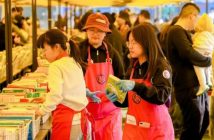
In 2010, researchers announced that over 90 million people in China were suffering from some form of diabetes (BBC News, March 2010) – a figure that does not account for the hundred of millions more showing early symptoms or unreported cases. Currently, it is estimated that around 10 percent of the world population will be diabetic by 2030 (healthcentral.com). Because diabetes affects so many lives, awareness amongst the general public and support from the community is vital – which is where Dr. Gerald Anthony comes in.
Originally from the US, Dr. Gerald Anthony first came to China in 2002 for a one-year assignment in the port city of Tianjin. One year turned into multiple years. He now works at Yew Chung International School of Beijing as senior admissions officer, and resides in Beijing with his wife Julia and 2-year-old son Javan, who has Type I diabetes. beijingkids spoke with Dr. Anthony about the reality of caring for a diabetic child and how he came about forming the support group, Diabetics Changing the World.
How did you find out Javan had diabetes?
Dr. Gerald Anthony: I should have recognized the symptoms, because my family has a recent history of diabetes, but to be honest, I didn’t realize my son was displaying them. The diagnosis process began when my son [who was 1 year old at the time]and wife had gone to see the grandparents for a few weeks. When the two of them returned from their visit, the first concern of mine was how much weight my son had lost. [I initially thought] this was due to differences in Eastern and Western diets. This hypothesis proved to be incorrect as time continued. [In] the following days, my son [became]skeletal, had a high fever and vomited. My male ego waited a few days to see if my son’s body could take care of itself, but after the fever did not break, we decided to take my son to the hospital. A blood test was completed, and the results were confirmed after a glucose analysis was run: Javan had diabetes.
Is diabetes hereditary?
GA: This is debatable. Some doctors will say that Type I diabetes
mellitus (juvenile diabetes) is hereditary. In my family, my uncle and my brother both have Type I. [However], my opinion is that of the minority in the medical field. I believe that the condition is not hereditary, but the increased likelihood of the condition is. Additionally, I believe it is not a hereditary condition, because my brother has Type I and I do not. We are identical, not fraternal twins.
What lifestyle adjustments have you and your family had to make to deal with her condition?
GA: To be honest, the news was very difficult to accept, especially for my wife. Growing up with diabetes in my family, I didn’t have too many mental adjustments. My wife, on the other hand, is adjusting to the reality that planning is an important component to our family’s lifestyle. Each day, we [prepare]insulin injections, test [his]blood sugar, prepare well-balanced and accurately measured meals and [maintain an]active exercise regimen.
As a diabetic, it is important to prepare yourself. While diabetes cannot be cured, it can be controlled. Real freedom does not come from lack of rules, but from consistency and an understanding of your environment. [My brother] has had Type I diabetes for over 20 years and is still happy and healthy.
How has living in Beijing affected all this?
GA: Living in Beijing has been a blessing for our family, because it is a nice balance between traditional and contemporary, East and West. With diabetes, there are three main areas you must keep in balance for a healthy lifestyle: diet, exercise and insulin. One advantage of living in Beijing, compared to the US, is that walking and cycling are more natural. Living in Beijing has also opened my eyes to the underserved families with diabetes. So many resources could be developed.
How did you come to decide to form the support group? What is the main idea of the group? What can prospective group members expect from joining the group?
GA: [As] I learned more and more about diabetes and developed relationships with more families, I noticed a huge need that had to be filled. My thought process is similar to a morning reflection I once read: “What is the difference between a thermostat and a thermometer?” A thermometer simply tells you the temperature in an environment. A thermostat adjusts the temperature in an environment. I wanted my family to be a thermostat in Beijing.
The support group I formed is called, Diabetics Changing the World (DCW) – [its]goal is to provide growth and support to diabetics and their families [in English]in a confidential, safe setting through teaching and sharing at social gatherings by partnering with various community channels. Prospective members should expect a full support network for themselves and their families both on and offline. As the group grows, we will begin having education and mentoring sessions.
What role did Beijing United Family Hospital have in forming the group?
GA: Beijing United Family (BJU) is a great organization. I truly believe one of the reasons it is so successful is because it is a part of the Beijing community, and not just a medical service. Originally I thought about working with BJU, because I volunteer at the United Foundation for Children’s Health, a foundation they strongly support. After arrangements were made to present the idea to their hospital administrative staff, they warmly received the idea of championing a support group for diabetes. They have offered their facilities for all meetings along with medical staff to give information sessions to the group. I am truly thankful for their generosity.
Diabetics Changing the World (DCW)
Meetings take place on the second and fourth Tuesday of each month from 6-8pm at Beijing United Family Hospital. For more information, contact Dr. Gerald Anthony at anyuan2002mmp@gmail.com.
Beijing United Family Hospital 北京和睦家医院
2 Jiangtai Lu, Chaoyang District (5927 7000) 朝阳区将台路2号



